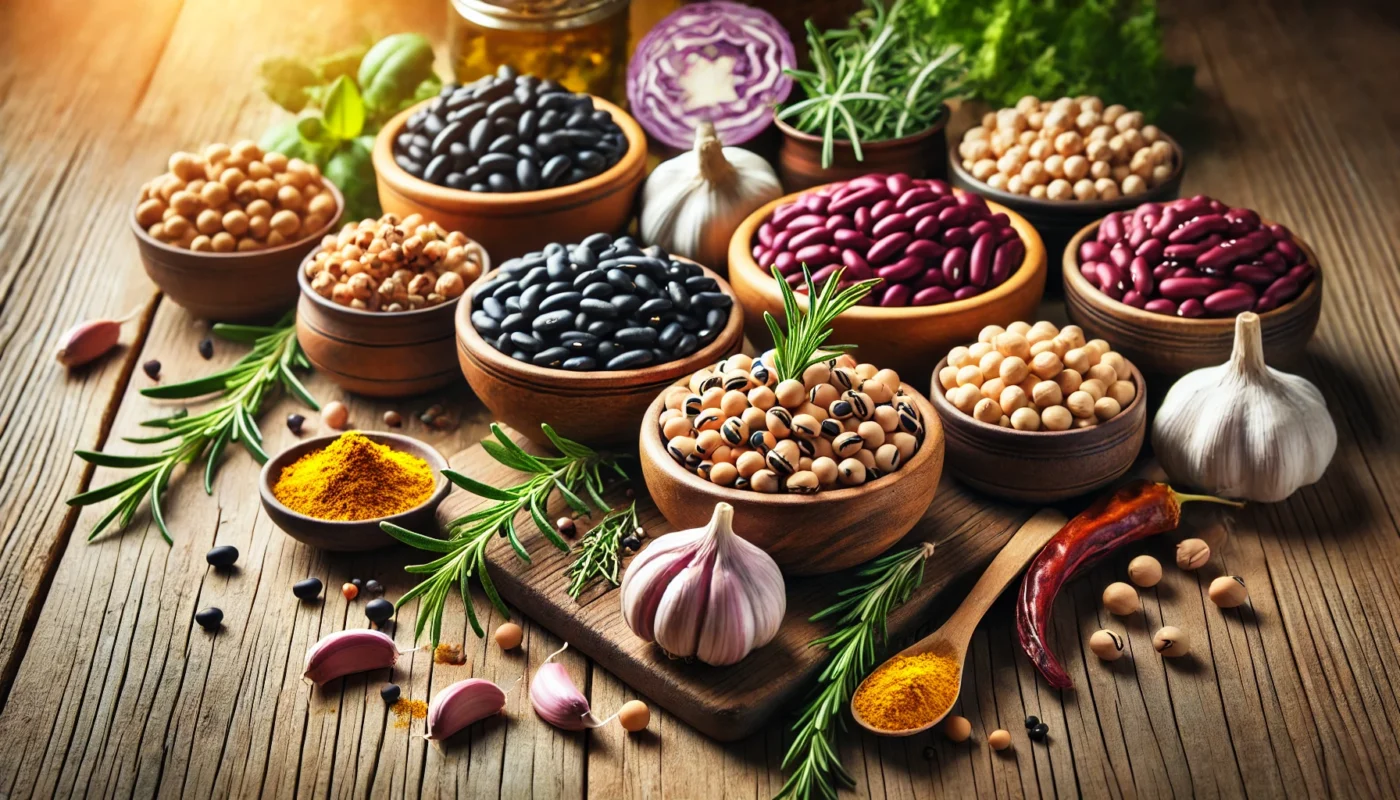Inflammation is a natural biological response to injury or infection. It’s a critical part of the body’s defense mechanism, involving immune cells, blood vessels, and molecular mediators. However, when inflammation becomes chronic, it can lead to various health issues, including heart disease, arthritis, and certain cancers. Therefore, managing inflammation through diet has become an essential consideration in holistic health practices.
You may also like: 20 Powerful Anti-Inflammatory Foods
The Nature of Inflammation
Inflammation can be classified into two types: acute and chronic. Acute inflammation is short-term and beneficial, often resolving the underlying issue. In contrast, chronic inflammation persists over a longer period, causing damage to healthy tissues and potentially leading to disease. Understanding this distinction is crucial for recognizing the importance of dietary choices in managing inflammation.
Causes of Chronic Inflammation
Chronic inflammation can arise from various factors, including persistent infections, prolonged exposure to irritants, and autoimmune responses where the body’s immune system attacks its own tissues. Lifestyle factors such as poor diet, lack of exercise, and chronic stress also contribute significantly to the development of chronic inflammation. Addressing these factors through dietary interventions can be a proactive step towards reducing inflammation.
Dietary Influence on Inflammation
The foods we consume can either exacerbate or alleviate inflammation. Diets high in processed foods, sugars, and unhealthy fats are linked to increased inflammation. Conversely, diets rich in whole foods, such as fruits, vegetables, and legumes, are associated with reduced inflammatory markers. Beans, with their rich nutrient profile, fit perfectly into the latter category, offering a protective effect against inflammation.
Are Beans Inflammatory?
The question “are beans inflammatory?” often arises due to misconceptions about legumes and their effects on the body. While some individuals may experience digestive discomfort with beans, this does not equate to inflammation. In fact, beans are generally considered anti-inflammatory due to their rich nutrient profile.
Misconceptions About Beans
There are several misconceptions about beans, one being that they cause inflammation. This misunderstanding may stem from the digestive discomfort some people experience, such as gas and bloating. However, this is typically a result of the body’s adjustment to increased fiber intake rather than an inflammatory response. Understanding this can help individuals incorporate beans into their diet without undue concern.
Beans and Digestive Health
While beans are rich in fiber, which supports digestive health, some people may initially struggle with their digestion. This is often due to oligosaccharides, a type of carbohydrate that can cause gas. Gradually introducing beans into your diet and using proper preparation methods, such as soaking, can significantly reduce these effects and improve digestive comfort over time.
Scientific Consensus on Beans
Scientific research supports the anti-inflammatory potential of beans. Studies have consistently shown that beans’ high fiber, protein, and antioxidant content contribute to their health benefits. These components work together to support gut health, modulate immune responses, and reduce markers of inflammation, reinforcing the role of beans as a valuable dietary component in managing inflammation.
Nutritional Profile of Beans
Beans are a powerhouse of nutrients, offering a unique combination of proteins, fibers, vitamins, and minerals, all of which contribute to their health benefits.
Proteins and Fibers
Beans provide a significant source of plant-based protein, which is crucial for muscle repair and overall health. Protein is essential for the repair and growth of tissues, enzymes, and hormones. Moreover, the high fiber content in beans supports digestive health by promoting regular bowel movements and serving as a prebiotic for gut-friendly bacteria. Prebiotics are non-digestible fibers that act as food for probiotics, the beneficial bacteria in the gut.
Vitamins and Minerals
Beans are abundant in essential vitamins and minerals, including folate, magnesium, potassium, and iron. Folate is vital for DNA synthesis and repair, magnesium is involved in over 300 biochemical reactions in the body, potassium helps maintain normal blood pressure, and iron is crucial for oxygen transport in the blood. These nutrients play vital roles in various bodily functions, from energy production to maintaining nerve and muscle function.
Phytochemicals and Antioxidants
Beans are rich in phytochemicals and antioxidants, such as flavonoids and polyphenols, which help combat oxidative stress and reduce inflammation. Oxidative stress occurs when there is an imbalance between free radicals and antioxidants in the body, leading to cell damage. These compounds neutralize free radicals and protect cells from damage, contributing to their anti-inflammatory effects. The presence of these bioactive compounds makes beans an excellent choice for those seeking to enhance their antioxidant intake.

Scientific Insights into Beans and Inflammation
Recent studies have highlighted the potential of beans to modulate inflammation, offering promising insights for those seeking natural dietary interventions.
Research Findings
Several studies have demonstrated that regular consumption of beans can lead to decreased markers of inflammation in the body. For instance, a study published in the Journal of Nutrition found that individuals who incorporated beans into their diet showed a reduction in C-reactive protein (CRP), a key marker of inflammation. This reduction in CRP levels indicates a lower risk of developing inflammatory-related diseases, showcasing the potential of beans as a dietary intervention.
Mechanisms of Action
The anti-inflammatory effects of beans are attributed to their high fiber content, which supports gut health, and their rich antioxidant profile, which reduces oxidative stress. Fiber helps maintain a healthy gut microbiome, which is crucial for modulating immune responses. Additionally, beans contain bioactive compounds that modulate inflammatory pathways, further contributing to their health benefits. These compounds interact with molecular pathways involved in inflammation, offering a multi-faceted approach to reducing inflammation.
Long-term Health Benefits
Incorporating beans into your diet offers long-term health benefits beyond reducing inflammation. Regular bean consumption is associated with a lower risk of chronic diseases such as heart disease, type 2 diabetes, and certain cancers. This is likely due to the combined effects of their nutrient density, fiber content, and antioxidant properties. By promoting overall health and reducing disease risk, beans serve as a valuable addition to a balanced, anti-inflammatory diet.

Practical Tips for Incorporating Beans into Your Diet
Incorporating beans into your diet is a practical and effective way to harness their anti-inflammatory benefits. Here are some strategies to help you get started:
Diversify Your Bean Selection
To maximize the benefits, include a variety of beans in your diet, such as black beans, kidney beans, chickpeas, and lentils. Each type offers a unique nutrient profile and flavor, adding diversity to your meals. Rotating different types of beans not only prevents dietary monotony but also ensures a broader range of nutrients and phytochemicals, enhancing their health benefits.
Cooking Tips
Proper preparation and cooking can enhance the digestibility and nutritional value of beans. Soaking beans overnight can reduce compounds that may cause digestive discomfort, such as oligosaccharides and phytic acid. This process also decreases cooking time and improves texture. Cooking them thoroughly ensures they are easy to digest and maximizes nutrient absorption, making them a more enjoyable and beneficial addition to your diet.
Recipe Ideas
Beans are incredibly versatile and can be added to various dishes. Consider adding them to salads, soups, stews, and even baked goods. A simple bean salad with fresh vegetables, olive oil, and lemon juice makes for a nutritious and anti-inflammatory meal. Try incorporating beans into your breakfast with a hearty bean and vegetable omelet or enjoy them as a protein-rich snack in the form of roasted chickpeas. The possibilities are endless, allowing you to enjoy the health benefits of beans in numerous delicious ways.

Conclusion: Beans as a Holistic Dietary Component
In conclusion, beans are more than just a dietary staple; they are a holistic component that can significantly contribute to reducing inflammation and enhancing overall health. By understanding the nutritional and anti-inflammatory benefits of beans, you can make informed choices to improve your diet and wellbeing.
Embracing Bean Diversity
Whether you’re a fitness enthusiast, a health enthusiast, or managing a medical condition, incorporating a variety of beans into your meals offers a multitude of benefits. Embrace the versatility and nutritional power of beans, and take a step towards a healthier, inflammation-free lifestyle. The wide range of beans available allows you to experiment with different flavors and textures, making healthy eating an enjoyable and sustainable practice.
Supporting Overall Health
By integrating beans into your diet, you not only enrich your meals with essential nutrients but also support your body’s natural ability to fight inflammation. The long-term health benefits of beans extend beyond inflammation, contributing to improved heart health, better blood sugar control, and enhanced digestive function. Regular bean consumption supports overall health, making them a valuable addition to any diet.
Making Beans a Staple
So the next time you’re planning your meals, consider beans as a delicious and health-promoting option. Their affordability, availability, and ease of preparation make them an accessible and practical choice for individuals and families alike. By making beans a staple in your diet, you invest in a healthier future, reaping the benefits of their rich nutrient profile and anti-inflammatory properties.
Further Reading:
Food as Medicine: Anti-Inflammatory Diet
8 Anti-Inflammatory Foods Arthritis Nutritionists Want You to Eat More Often
Potential anti-inflammatory effects of legumes: a review
anti-inflammatory, beans, nutrition, health benefits, chronic inflammation, dietary choices, legumes, digestive health, antioxidants, fiber, plant-based protein, holistic health, meal planning, recipes, wellness, inflammation management
Important Note: The information contained in this article is for general informational purposes only, and should not be construed as health or medical advice, nor is it intended to diagnose, prevent, treat, or cure any disease or health condition. Before embarking on any diet, fitness regimen, or program of nutritional supplementation, it is advisable to consult your healthcare professional in order to determine its safety and probable efficacy in terms of your individual state of health.
Regarding Nutritional Supplements Or Other Non-Prescription Health Products: If any nutritional supplements or other non-prescription health products are mentioned in the foregoing article, any claims or statements made about them have not been evaluated by the U.S. Food and Drug Administration, and such nutritional supplements or other health products are not intended to diagnose, treat, cure, or prevent any disease

